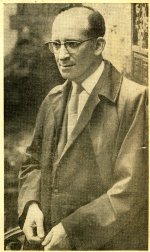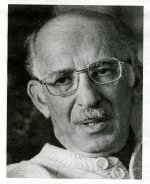
Bern was competitive. By that I do not mean that he would do anything to win - such as chew an opponent's ear. He could become very intense in holding a point of view, even argumentatively flooring his opponent. A polite exchange was not his style. Even his intense stare could make some insecure people uncomfortable, in thinking that they were being physically scrutinized or, even more so, mentally analyzed for Bern's possible use in creating one of his characters.

Photo by Seymour Linden, 1961.
"The Awakening of S. Levin." Jessamyn West. Publisher unknown. October [?] 1961.
How or why he decided to become a writer, I do not know; but once he did, the effort dominated his life. He strove to write the best he was able to - not primarily to entertain or to make money. The novels and short stories did not pour out as they do with some writers. His integrity kept reign over compulsiveness and carelessness. In many ways he demonstrated that keeping control was essential. For instance, he was not a drinker, although he liked wine with dinner and occasionally had a scotch. His wariness of alcohol, I think, came from fear of its loosening intellectual control, which some people drink for. He would not like to say something that slipped out unintentionally - observant, amusing or critical. I did not find him uptight, but he wasn't casual either.
When confronted with something that he judged wrong, he took it head on. A young English instructor who was an activist type inclined to demonstrate on political issues joined a group of sloppily clad protestors with placards. During a Saturday event at the stadium, they paraded antagonistic slogans in front of the audience dominated by conservative alumni. When word of the participation finally reached the English department, the head was so indignant that he called in the instructor and fired him. The instructor, in turn, was so troubled that he went to Bern at home to tell of the confrontation. Bern, determinedly representing the instructor, went to the head to emphasize the unfairness of the dismissal. I can imagine the head wilting under Bern's concentrated gaze and emphatic diction. The instructor continued to teach classes for the rest of the year but departed in June. Bern was just the right person to turn to under such circumstances. The head undoubtedly envisioned Bern as the leader of the department's "young Turks." Bern was not wishy-washy. He had values which he could and did verbalize most expeditiously.
In addition to being highly intelligent, he was highly moral. In a conversation one day, I - for whatever reason - told him how taken aback I had been by a lecture on sex that the freshmen at Dartmouth were required to attend. The speech in 1936 was far advanced in most of its details. A statement in point was that masturbation was not a sin, that it might even keep an individual out of trouble elsewhere. Bern's eyes opened wide and his head pulled back as he emphatically pronounced that the instuctor was wrong. But then his eyebrows contracted as he devised an adjustment. "It should not become a matter of habit." I had, I thought, viewed an unintended insight into his thinking process. I suspect that his first reaction was an outlet from the severe moral training Jewish boys are still subject to in preparing for Bar Mitzvah. This reaction had come from the depths of Bern's mind; but upon recognizing the severity to his reaction, he modified the traditional dictum to an updated allowance. The immediate response alerted me to the embedded moral basis of his thinking. Since many of my friends are Jewish, I have thought that I have occasionally noted a comparable glimpse of the bedrock training buried deep but ready to assert. I have never observed a comparable demonstration by my close Christian friends - even Catholics.

Credit: The Oregon Stater, 1996.
"Malamud: A Novelist Finds his Voice at Oregon State." Tom Bennett. OSU Oregon Stater, v.80 n.3 p.12. June 1996 .

